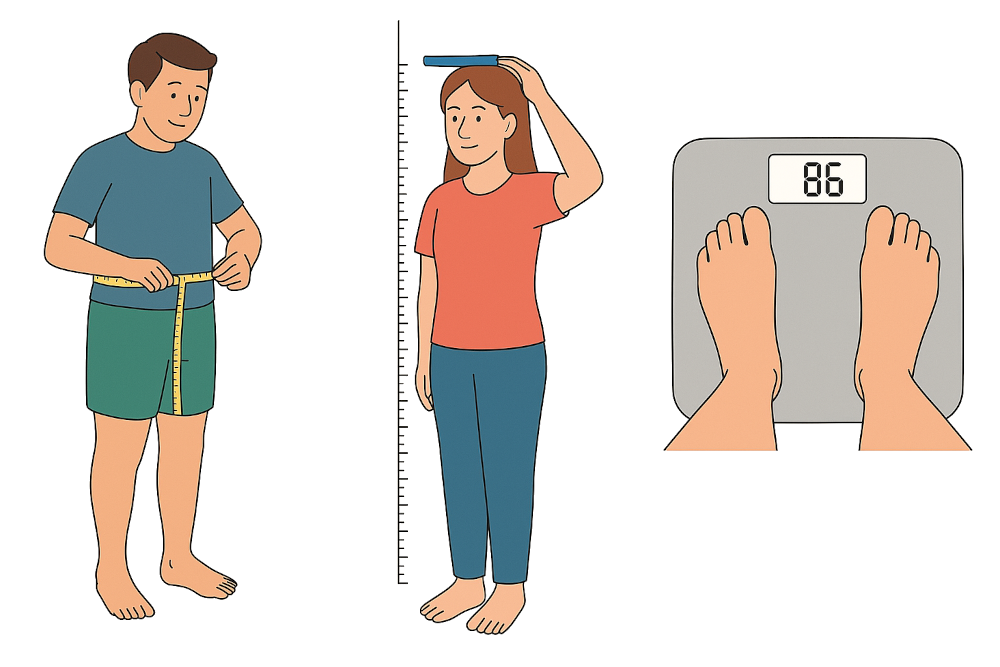About measure.health
Our Mission
At measure.health, our mission is to empower individuals to take control of their health through the monitoring of key health metrics which are different for each individual. Knowledge is power, and by providing easy-to-use tools and evidence-based insights, we can help people make informed decisions about their health and well-being.

Why Track More Than Just Weight?
While tracking weight is common, it is even easier to measure and track your waistline which may be more useful for those with the intention of weight gain or loss. Waistline measuresments can also give a broader picture of ones health and used in conjunction with weight and height, ones Body Mass Index (BMI) and Waist-to-Height Ratio (WtHR) can be calculated to provide another picture of ones health. Unlike weight alone, these measurements help assess body composition and fat distribution.
Health Issues Related to Inadequate BMI and WtHR
- Cardiovascular disease
- Type 2 diabetes
- Hypertension
- Sleep apnea
- Joint problems
- Certain types of cancer
Understanding Additional Health Metrics
Blood Pressure (Systolic/Diastolic)
Blood pressure is recorded as two numbers: systolic pressure (when the heart beats) over diastolic pressure (when the heart rests). Regular monitoring can help detect hypertension early, a condition that often has no symptoms but can lead to serious health problems like heart disease and stroke.
Blood Glucose
Blood glucose monitoring measures the amount of sugar in your blood. Available in both mg/dL (commonly used in the US) and mmol/L (used internationally), tracking these levels is crucial for managing diabetes and understanding how your body processes sugar. Even for those without diabetes, tracking can provide insights into metabolic health.
Primary Use Cases for Glucose Tracking
| Timing | Purpose | Target Range* |
|---|---|---|
| Fasting (morning) | Assess baseline metabolic state | <100 mg/dL (<5.6 mmol/L) |
| Post-meal (1–2 hr) | Measure glucose clearance efficiency | <140 mg/dL (<7.8 mmol/L) |
| Pre/post exercise | Understand glucose stability under load | Varies by individual |
*Target ranges for non-diabetic individuals. Consult your healthcare provider for personalized guidance.
Using tags with your glucose readings allows you to identify patterns related to specific foods, activities, or experiments. For example, tagging readings with "breakfast", "high-carb", or "fasted workout" can help you understand how different factors affect your glucose levels.
Heart Rate
Your heart rate, or pulse, indicates how many times your heart beats per minute. Tracking your resting heart rate over time can provide insights into your cardiovascular fitness and overall health. A lower resting heart rate generally indicates better cardiovascular fitness.
Blood Oxygen (SpO₂)
Blood oxygen saturation (SpO₂) measures the percentage of oxygen-saturated hemoglobin in your blood. Levels below 95% may indicate respiratory issues. Monitoring SpO₂ can be particularly important for those with respiratory conditions or during physical activity at high altitudes.
Steps Walked
Tracking daily steps encourages physical activity and helps maintain cardiovascular health. The often-cited goal of 10,000 steps per day is a good target for many, but any increase in activity can improve health outcomes. Regular walking has been linked to weight management, improved mood, and reduced risk of chronic diseases.
Hours Slept
Sleep duration and quality significantly impact overall health, cognitive function, and emotional well-being. Adults typically need 7-9 hours of quality sleep per night. Tracking sleep patterns can help identify issues and improve sleep hygiene, contributing to better health outcomes and daily performance.
Track Changes to See Results
This app helps you monitor the effectiveness of diet and lifestyle changes. You may be losing weight or improving your body composition slowly without noticing. Regular tracking provides objective data to see your progress over time.
Simple Commitment to Health
Instead of stressing or worrying about your weight, make the simple decision to commit to tracking your waistline, height, and weight on a regular basis. All you need is a measuring tape and scales, and it only takes minutes to measure.
Know Your Numbers
You may be slowly losing weight and not even realize it. You may have a healthy weight or even BMI but an unhealthy waistline and not even know it. Start keeping track now, it's free, quick and easy so you have no excuse.